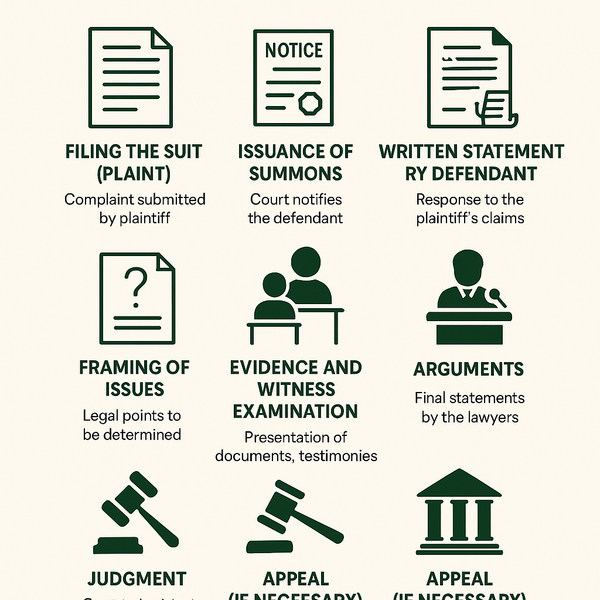Understanding the civil court process in Pakistan can be daunting, especially for those unfamiliar with the country’s legal system. Whether you’re filing a civil suit or responding to one, it’s essential to know what to expect. Civil cases typically involve disputes between individuals or organizations over rights, contracts, property, family matters, or damages — rather than criminal offenses.
1. Filing the Suit (Plaint)
The civil case begins with the filing of a plaint, which is the formal written complaint submitted to the court by the plaintiff. It includes the facts of the case, legal claims, and the relief being sought. The court, after reviewing the plaint, may issue a notice to the defendant to appear and respond.
2. Issuance of Summons
Once the case is admitted, the court issues a summons to the defendant. This legal document informs the defendant about the case and the date on which they must appear in court.
3. Written Statement by Defendant
The defendant is required to submit a written statement, presenting their side of the story and denying or accepting the claims made by the plaintiff. This stage is critical as it sets the foundation for the arguments that follow.
4. Framing of Issues
After both sides submit their claims and defenses, the court frames the issues — specific legal questions that need to be answered during the trial. This helps narrow down the focus of the case.
5. Evidence and Witness Examination
Both parties are asked to present their evidence, which can include documents, photos, contracts, and witness testimonies. The examination-in-chief, cross-examination, and re-examination of witnesses take place during this stage.
6. Arguments
Once all evidence is presented, both lawyers give their final arguments before the court. These are verbal summaries of the case, emphasizing legal points, evidence, and relevant precedents.
7. Judgment
After hearing both sides, the judge reserves the case for a judgment, which is usually delivered within a few weeks. The decision may include the awarding of damages, injunctions, or other legal reliefs.
8. Appeal (if necessary)
If either party is unsatisfied with the decision, they have the right to file an appeal in a higher court within a specified time frame.
Key Considerations
- Civil cases in Pakistan often face delays due to backlog and procedural inefficiencies.
- Hiring an experienced civil lawyer can significantly impact the outcome.
- Documentation and punctuality are crucial throughout the legal process.
Understanding each stage of a civil case can help litigants stay informed, organized, and prepared. Whether you’re the plaintiff or the defendant, knowing what to expect ensures your rights are adequately protected.
#PakistanLaw #CivilCourtPakistan #LegalAdvicePK #CivilLitigation #PakistaniLegalSystem #LawyerPakistan #CourtProcedurePK #LegalRightsPakistan #KnowYourRights #JusticeInPakistan #FamilyLawPK #PropertyLawPakistan

